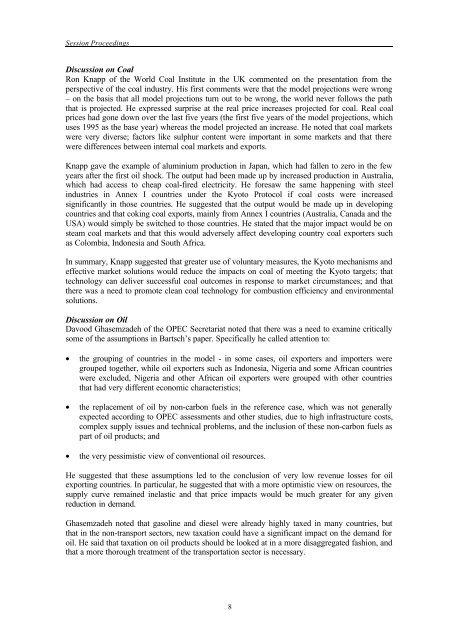sectoral economic costs and benefits of ghg mitigation - IPCC
sectoral economic costs and benefits of ghg mitigation - IPCC
sectoral economic costs and benefits of ghg mitigation - IPCC
You also want an ePaper? Increase the reach of your titles
YUMPU automatically turns print PDFs into web optimized ePapers that Google loves.
Session Proceedings<br />
Discussion on Coal<br />
Ron Knapp <strong>of</strong> the World Coal Institute in the UK commented on the presentation from the<br />
perspective <strong>of</strong> the coal industry. His first comments were that the model projections were wrong<br />
– on the basis that all model projections turn out to be wrong, the world never follows the path<br />
that is projected. He expressed surprise at the real price increases projected for coal. Real coal<br />
prices had gone down over the last five years (the first five years <strong>of</strong> the model projections, which<br />
uses 1995 as the base year) whereas the model projected an increase. He noted that coal markets<br />
were very diverse; factors like sulphur content were important in some markets <strong>and</strong> that there<br />
were differences between internal coal markets <strong>and</strong> exports.<br />
Knapp gave the example <strong>of</strong> aluminium production in Japan, which had fallen to zero in the few<br />
years after the first oil shock. The output had been made up by increased production in Australia,<br />
which had access to cheap coal-fired electricity. He foresaw the same happening with steel<br />
industries in Annex I countries under the Kyoto Protocol if coal <strong>costs</strong> were increased<br />
significantly in those countries. He suggested that the output would be made up in developing<br />
countries <strong>and</strong> that coking coal exports, mainly from Annex I countries (Australia, Canada <strong>and</strong> the<br />
USA) would simply be switched to those countries. He stated that the major impact would be on<br />
steam coal markets <strong>and</strong> that this would adversely affect developing country coal exporters such<br />
as Colombia, Indonesia <strong>and</strong> South Africa.<br />
In summary, Knapp suggested that greater use <strong>of</strong> voluntary measures, the Kyoto mechanisms <strong>and</strong><br />
effective market solutions would reduce the impacts on coal <strong>of</strong> meeting the Kyoto targets; that<br />
technology can deliver successful coal outcomes in response to market circumstances; <strong>and</strong> that<br />
there was a need to promote clean coal technology for combustion efficiency <strong>and</strong> environmental<br />
solutions.<br />
Discussion on Oil<br />
Davood Ghasemzadeh <strong>of</strong> the OPEC Secretariat noted that there was a need to examine critically<br />
some <strong>of</strong> the assumptions in Bartsch’s paper. Specifically he called attention to:<br />
• the grouping <strong>of</strong> countries in the model - in some cases, oil exporters <strong>and</strong> importers were<br />
grouped together, while oil exporters such as Indonesia, Nigeria <strong>and</strong> some African countries<br />
were excluded, Nigeria <strong>and</strong> other African oil exporters were grouped with other countries<br />
that had very different <strong>economic</strong> characteristics;<br />
• the replacement <strong>of</strong> oil by non-carbon fuels in the reference case, which was not generally<br />
expected according to OPEC assessments <strong>and</strong> other studies, due to high infrastructure <strong>costs</strong>,<br />
complex supply issues <strong>and</strong> technical problems, <strong>and</strong> the inclusion <strong>of</strong> these non-carbon fuels as<br />
part <strong>of</strong> oil products; <strong>and</strong><br />
• the very pessimistic view <strong>of</strong> conventional oil resources.<br />
He suggested that these assumptions led to the conclusion <strong>of</strong> very low revenue losses for oil<br />
exporting countries. In particular, he suggested that with a more optimistic view on resources, the<br />
supply curve remained inelastic <strong>and</strong> that price impacts would be much greater for any given<br />
reduction in dem<strong>and</strong>.<br />
Ghasemzadeh noted that gasoline <strong>and</strong> diesel were already highly taxed in many countries, but<br />
that in the non-transport sectors, new taxation could have a significant impact on the dem<strong>and</strong> for<br />
oil. He said that taxation on oil products should be looked at in a more disaggregated fashion, <strong>and</strong><br />
that a more thorough treatment <strong>of</strong> the transportation sector is necessary.<br />
8
















